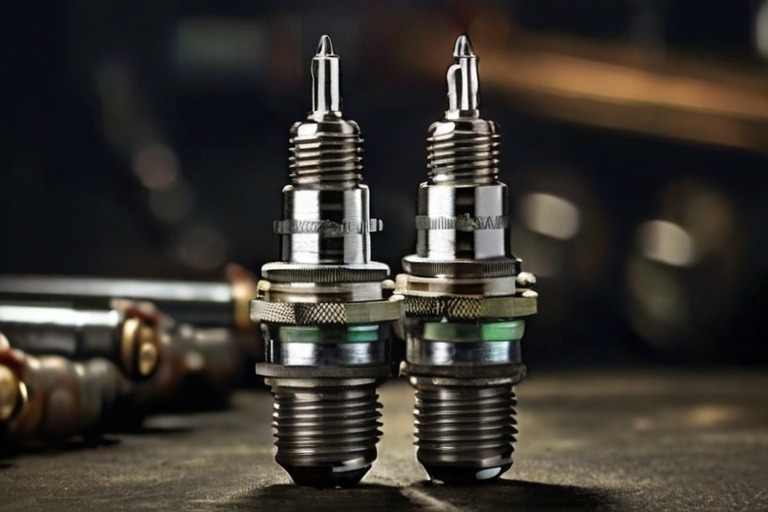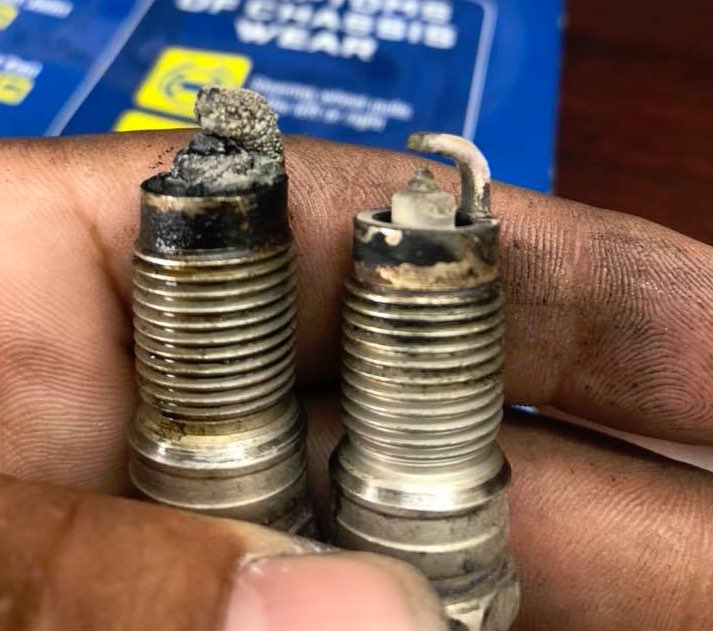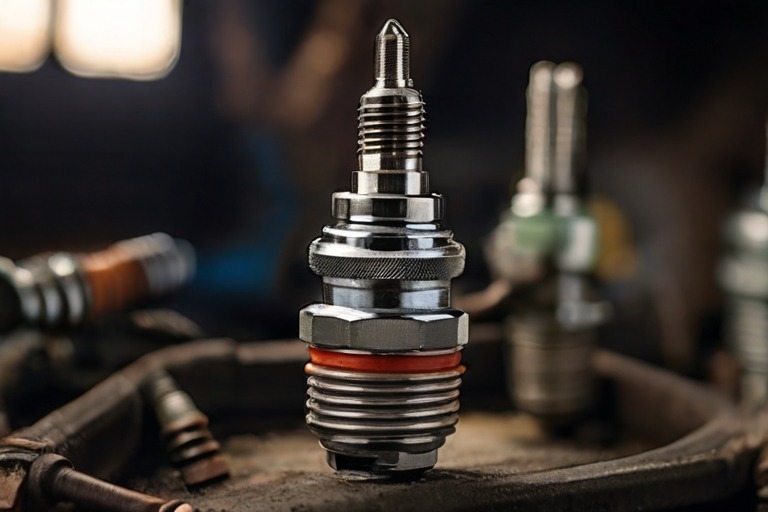Is your vehicle stuttering, failing to start, or just not running as smoothly as it used to? These could all be signs that you’re dealing with bad spark plugs. As a vital part of your engine’s ignition system, spark plugs play a major role in ensuring your vehicle operates efficiently and reliably.
In this guide, we’re going to delve deep into the signs and symptoms of bad spark plugs. Understanding these signs can help you identify when it’s time for a replacement, potentially saving you from costly repairs down the line. So buckle up and get ready to become an expert in recognizing the signs of bad spark plugs.
Common Symptoms of Bad Spark Plugs
Knowing the health of your car’s spark plugs can save you from sudden breakdowns and costly repairs. But how do I know if spark plugs are bad? There are several common symptoms that could indicate your spark plugs need replacing. First, you may notice a decrease in fuel efficiency. Bad spark plugs can cause your engine to consume more fuel than necessary, burning a hole in your pocket.
Second, you might experience difficulty starting your car. The spark plug is crucial for igniting the fuel in your engine – faulty plugs can lead to ignition problems. Third, if your engine is idling roughly or you notice a lack of acceleration power, it could be a sign of worn-out spark plugs.
Lastly, a common symptom of bad spark plugs is misfiring engines, which can cause your vehicle to jerk and vibrate. Regularly checking and replacing your spark plugs can ensure a smooth and efficient ride, saving you time, money, and stress in the long run. Don’t ignore these warning signs – take care of your car, and it will take care of you.

The Impact of Bad Spark Plugs on Your Vehicle’s Performance
If you’re wondering, “How do I know if spark plugs are bad?” – you’ve come to the right place. Bad spark plugs can dramatically impact your vehicle’s performance. They are tiny devices that deliver an electric current from the ignition system to the combustion chamber, sparking off the mixture of fuel and air.
When they fail, your vehicle might run roughly, consume more fuel, and even struggle to start. Misfires, poor acceleration, and high fuel consumption are all telltale signs of faulty spark plugs. Regular inspection and replacement of worn-out spark plugs are crucial to maintaining your vehicle’s performance and keeping you safe on the road.
Beyond the apparent benefits of smooth driving, good spark plugs also contribute to fuel efficiency and lower emissions, meaning they’re better for your wallet and the environment. In essence, these small, often-overlooked components play a huge role in your vehicle’s overall health and efficiency.
How to “Read” your Spark Plugs | Goss’ Garage
If your car isn’t starting as easily as it used to, or if it’s idling roughly, there’s a chance your spark plugs may be to blame. Here are a few signs that your spark plugs may need to be replaced:
1. Your engine is misfiring. If you notice that your engine is misfiring or running unevenly, it could be a sign that one or more of your spark plugs is bad.
2. Your fuel economy has gone down. If you’re suddenly using more gas than usual, it could be due to bad spark plugs causing your engine to run less efficiently.
3. You’ve noticed a decrease in power. If your car doesn’t seem to have the same get-up-and-go as before, worn-out spark plugs could be the culprit.
4. Your car is hard to start.
How to Tell If Spark Plugs are Bad by Looking at Them
If your car isn’t starting as easily as it used to, or if you’re noticing a drop in fuel efficiency, it might be time to check your spark plugs. Over time, spark plugs can become fouled or damaged, affecting their ability to do their job. Fortunately, it’s easy to tell if spark plugs are bad by looking at them.
If you remove the plug and take a close look, you’ll be able to see if there’s any damage or build-up on the electrode. A healthy spark plug should have a smooth, clean electrode with a sharp point. If the electrode is burnt or damaged in any way, it’s likely that the plug is bad and needs to be replaced.
Another way to tell if a spark plug is bad is by looking at the color of the ceramic insulator. A healthy plug will have a white or light-gray insulator, while a fouled or damaged plug will have a blackened or brownish insulator. If you’re unsure whether or not your spark plugs need to be replaced, it’s always best to consult with a professional mechanic who can take a closer look and give you an expert opinion.

Credit: agradetools.com
How Do I Know If My Spark Plugs Need Changing?
If you’re unsure whether or not your spark plugs need to be changed, there are a few telltale signs that can help you decide.
First, if your car is starting to feel sluggish, it might be time for new spark plugs. If you notice a decrease in fuel economy, that’s another sign that your plugs might need to be replaced.
Additionally, if your engine is misfiring or running rough, new spark plugs could help.
If any of these things are happening with your car, it’s a good idea to take it in for a tune-up so a mechanic can take a look at the condition of your spark plugs and replace them if necessary.
What Does It Feel Like When You Have Bad Spark Plugs?
When you have bad spark plugs, your car will feel like it’s struggling to run. You may notice a decrease in power and an increase in fuel consumption. Your engine may also misfire or hesitate when you try to accelerate. If your spark plugs are severely fouled, you may even experience engine failure.

Avoiding Spark Plug Problems: Maintenance Tips and Tricks
For many car enthusiasts, the question of “How Do I Know If Spark Plugs Are Bad?” is a common one. The health of your spark plugs is crucial for your vehicle’s performance and fuel efficiency. Engine misfires, poor fuel economy, difficulty starting the vehicle, and a noticeable drop in power are all telltale signs of failing spark plugs.
If your vehicle idles roughly or accelerates sluggishly, it’s time to check the spark plugs. Regular maintenance and replacement of spark plugs can help prevent these issues and keep your vehicle running smoothly. Remember, prevention is always better than cure, especially when it comes to your vehicle’s health.
Regular spark plug checks can save you from unexpected vehicle breakdowns and costly repair bills. A quick inspection at the mechanic’s or even a DIY check at home can go a long way in ensuring a smooth and efficient ride.

Frequently Asked Questions [FAQs]
What are the signs of bad spark plugs?
Bad spark plugs can manifest in various ways, including poor fuel economy, difficulty starting the engine, engine misfires, idle instability, reduced acceleration, and a noticeable decrease in power and performance. If you notice these symptoms, it’s worth having your spark plugs checked.
How do I check the condition of my spark plugs?
To check the condition of your spark plugs, you will need to remove them from the engine. For this, you’ll require a spark plug socket, ratchet, and extension bar. Once removed, inspect the spark plug for signs of wear or damage. Look for cracks, deposits, or any discoloration. If any of these signs are present, it might be time to replace your spark plugs.
How often should I replace my spark plugs?
The frequency of spark plug replacement depends on the type of spark plugs that are in your vehicle. Copper plugs should be replaced every 20,000-30,000 miles, platinum plugs every 60,000-70,000 miles, and iridium plugs can last up to 100,000 miles. However, these are just guidelines, and the specific replacement interval can vary based on your vehicle’s make and model.
Can I replace the spark plugs myself?
Yes, replacing spark plugs is a task that many people can do themselves with the right tools and knowledge. However, if you are not comfortable performing this task, it is recommended to take your vehicle to a professional mechanic.
How much does it cost to replace spark plugs?
The cost to replace spark plugs can vary depending on the type of plugs needed and the labor cost if you are not doing it yourself. On average, you can expect to pay between $40-$150 for parts and labor. High-performance or specialty spark plugs can cost more.
Conclusion
If your car is having trouble starting, it could be a sign that your spark plugs are bad. Other signs include poor fuel economy, engine misfires, and a decrease in power. You can check your spark plugs yourself to see if they need to be replaced.
